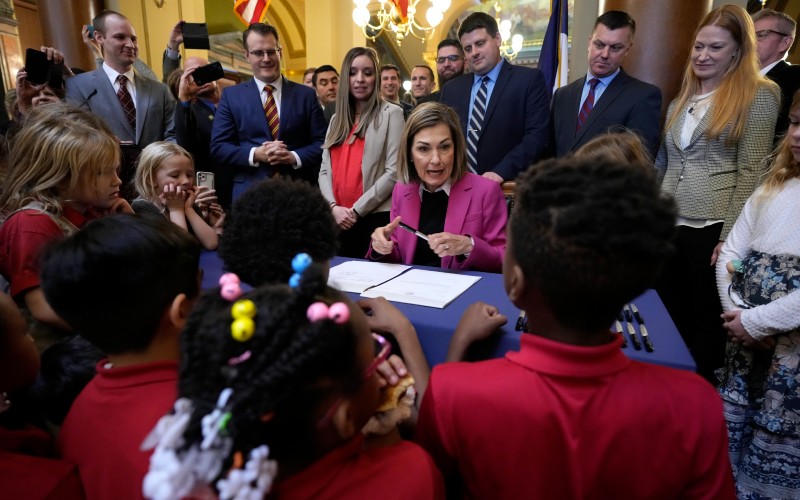House File 68, which passed narrowly this week, creates an education savings account, or ESA, for Iowa families to use to pay private school tuition. The maximum amount is $7,598 annually, The Des Moines Register reported.
The bill’s passage marked a political victory for Gov. Kim Reynolds (pictured below), who has supported the school-choice legislation for three years, but some Republicans joined Democrats in opposing the legislation in the House (nine) and the Senate (three), the Register said. The bill passed 55-44 in the House and 31-18 in the Senate.
 Andrew Handel, director of education and workforce development at the American Legislative Exchange Council, says ALEC is watching and supporting similar ESA legislation being introduced and debated in Ohio, Arkansas, Florida, and Utah. The school-choice push is important to ALEC because it supports limited government and free markets, and it works closely with state legislators who share those beliefs.
Andrew Handel, director of education and workforce development at the American Legislative Exchange Council, says ALEC is watching and supporting similar ESA legislation being introduced and debated in Ohio, Arkansas, Florida, and Utah. The school-choice push is important to ALEC because it supports limited government and free markets, and it works closely with state legislators who share those beliefs.
In Utah, Handel says state legislators have gotten behind the ESA movement and the state’s governor, Spencer Cox, is expected to sign the legislation.
“Utah is right there at the top of the list,” Handel advises.
With the Iowa's governor's signature, that state became the third one to pass such a measure, The Associated Press reported this week. The other states are West Virginia and Arizona.
“For the first time," Gov. Reynolds said, "we will fund students instead of a system, a decisive step in ensuring that every child in Iowa can receive the best education possible."
ESA bill 'about freedom for family'
As evidenced by Republican defectors in Iowa, the push for states to set up education savings accounts is predictably finding opposition even among those sympathetic to school choice. One reason cited often is the accusation public money is being taken from public school classrooms that will suffer.
“Spending public money with no accountability is reckless,” Sen. Molly Donahue, an Iowa Democrat, said during floor debate. “Our public schools and students deserve better.”
Rep. Heather Matson, another Democrat, likened the ESA to giving a private school student a “backpack full of money” while public school students suffer.
The counter-argument, meanwhile, is that “backpack full of money” came from Iowa taxpayers who have never, until now, had a say about public school funding but pay state and local taxes anyway. That view is especially true for parents who pay those taxes and also pay for private school tuition.

"This bill is about freedom," Rep. John Wills, a Republican, countered. "This bill is about freedom for the family to make a decision. This bill is about where that family feels that child will be best taught.”
Almost a year ago, when Iowa’s legislators were approving state budgets, the Register reported the legislature approved a 2.5% increase in per-pupil state aid. That increased the per-student amount to $7,413 per student from a state fund of $3.5 billion.
"The reality is this is simply about parents and families,” Handel tells AFN. “Funding aside, if that student is simply not going to learn best in that public school, no matter how much money they toss there, we need to make sure that that student has those other options available to them.”







